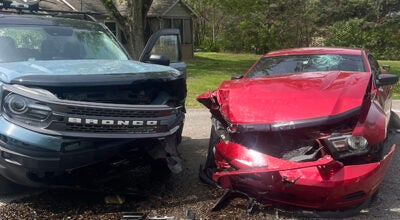Making life after prison possible
Published 10:07 pm Wednesday, June 9, 2010

Bill Anderson, a Niles native, recently moved from New York back to his hometown to start It's Possible Inc. The organization is a nonprofit that helps formerly incarcerated people find employment, housing and transportation. (Daily Star photo/AARON MUELLER)
By AARON MUELLER
Niles Daily Star
Bill Anderson has lived a successful life.
A former volleyball coach for the University of Notre Dame, Anderson spent 25 years living in New York working in child welfare and the prison systems. He had a six-figure salary and was making a difference in people’s lives.
But earlier this year, the 1978 Niles High School grad decided to leave that life behind and return to his family and his hometown.
He is continuing his mission of impacting people’s lives in Niles by starting a nonprofit organization called It’s Possible Inc., designed to help formerly incarcerated people build healthy lives and readjust to and make a difference in society.
“The organization started because I saw people with criminal histories that are being underserved,” Anderson said. “They aren’t being afforded the appropriate opportunities by the community. We’ve lost sight that they are human beings.”
The agency, which purchased an office at 1105 North Front St. in January, is designed to help its clients with education, job placement, finding a home, obtaining transportation and overcoming substance abuse problems – all of which can be extremely difficult for ex-offenders.
I’ve been there
Anderson understands the challenges that ex-offenders face, mainly because he has experienced some of them himself.
When he was a sophomore at the University of Cincinnati, he had no idea that a small slip-up would stick with him a long time.
The incident that took place in 1981 involved him stealing some Kraft American cheese from a grocery store as part of a fraternity prank. But Anderson was charged with armed robbery because the officer had to use force to arrest him.
Anderson was handed a 30-day sentence at a work-release center, and he continued his education at another school.
“I had the ability to move on and get my master’s degree,” Anderson said. “But it has stuck with me a long time, having to explain the situation for all jobs I applied for.”
A fast start
Even though It’s Possible Inc. won’t officially open until July, the agency has already been busy with numerous walk-ins and recommendations from correctional facilities.
Anderson has gone to bat for a Niles man, who asked to have his name withheld from the story, but will be referred to as “Jim.”
Jim is going through a messy divorce and could not afford a lawyer. He called Anderson the night before a meeting to help negotiate child support with his wife and her lawyer.
“And he agreed to go to court with me,” Jim said. “He advised me on what to do and to say. To find a program, to find someone who cares, I’m just really grateful.”
Jim and his soon to be ex-wife reached a fair agreement and are on good terms.
Still, Jim is struggling to make ends meet with only a part-time job at a fast food restaurant, but he said It’s Possible Inc. is helping him gain the skills needed to find a new job.
Jim knows it will be hard.
“Once you’re in the system, you’re tagged as an animal, a monster,” he said. “You’re no longer treated like a human being. You’re treated like somebody who is very dangerous.”
But Jim said the program has helped give him “a sense of hope,” as he is pursuing his GED and wants to go to college.
Anderson has also been trying to help another man, who will be referred to as “Craig.”
He has been unemployed since his release from a four-year prison term in April. He currently lives with his mother but has until Sunday to find somewhere else to live, because her landlord is kicking him out.
“Mr. Anderson has been on the phone all week trying to find me a place to stay,” Craig said.
It’s been especially difficult for Craig since he has received no help from the state-run Michigan Prisoner ReEntry Initiative (MRPI), as he is considered a “low-risk offender.”
The MRPI only targets those in prison and high-risk offenders that have been released, according to Anderson.
“We need something that helps everybody, and that’s exactly what Mr. Anderson is doing,” Craig said. “He helps everybody.”
Anderson says other than MRPI, there are very few agencies in Michigan that assist prisoners after their release, another reason why he started It’s Possible Inc.
Changing the culture
Anderson is hoping to change the way people see ex-offenders in southwest Michigan.
He is reaching out to business owners, landlords, the court system and churches in the area to get on board with the agency and help ex-offenders.
“I’m inviting employers in our area to give our agency an opportunity,” Anderson said. “There will be an extensive training program here. You will get good, responsible and accountable people from our agency.”
It’s also his goal to build a transitional housing facility in the Niles area.
“There are no men’s shelters in the city of Niles,” Anderson said. “I would like to find a location where we could have a 30- or 60-bed residential stay for people until appropriate housing can be found.”
It’s Possible Inc. is currently funded by private donations and Anderson’s own investment, but he is lining up grants and has partnered with the Fresh Start Prevention Program out of Benton Harbor.
Anderson is also building a small staff, including a therapist, educational coordinator and director of outpatient services. His fiscal officer and intern are both ex-offenders.
“As an agency that serves formerly incarcerated people, when I find one who is qualified, they will be become part of my staff,” he said.
More than anything, Anderson is hoping to develop a culture of second chances in the community.
“We all understand where they’ve been, but it’s where they are going is what’s important,” he said.






